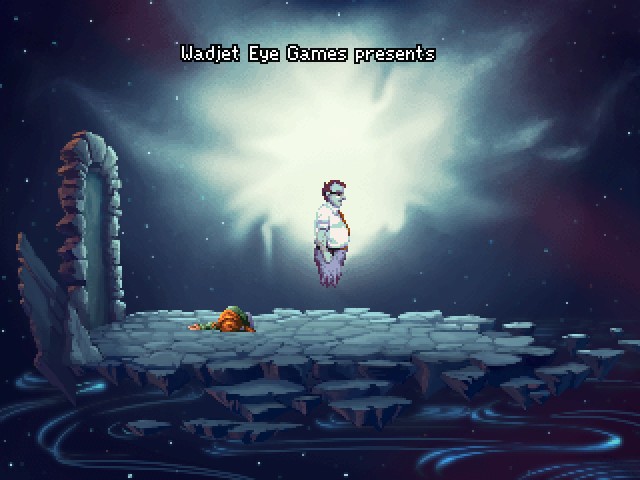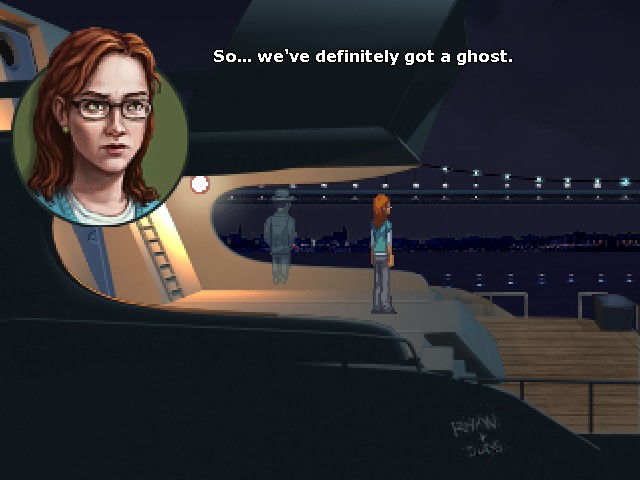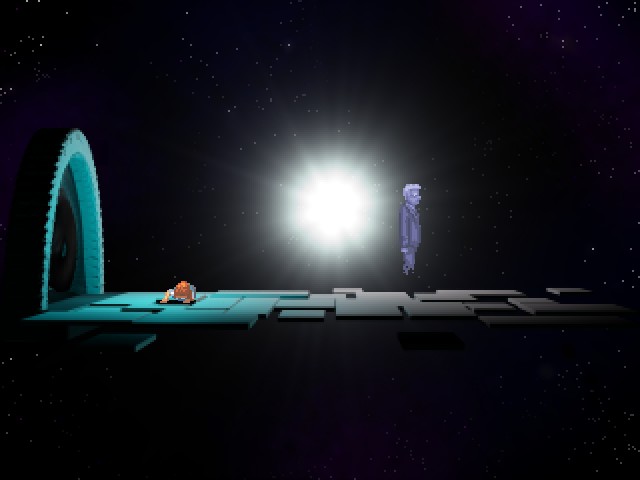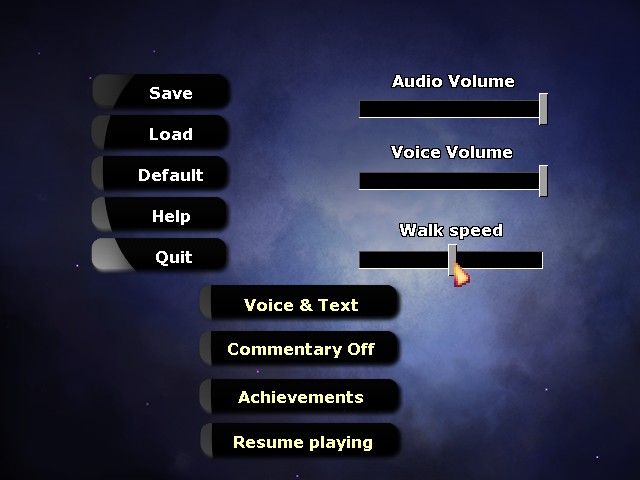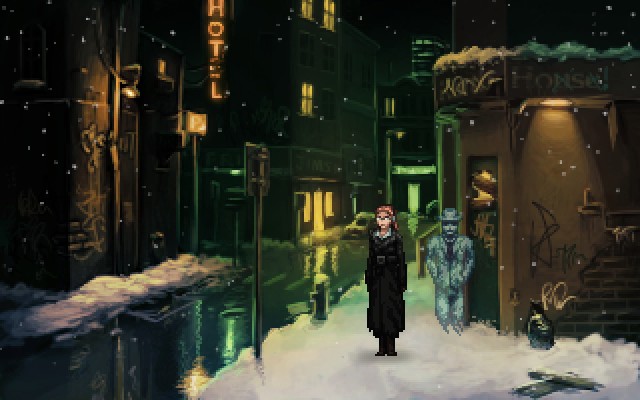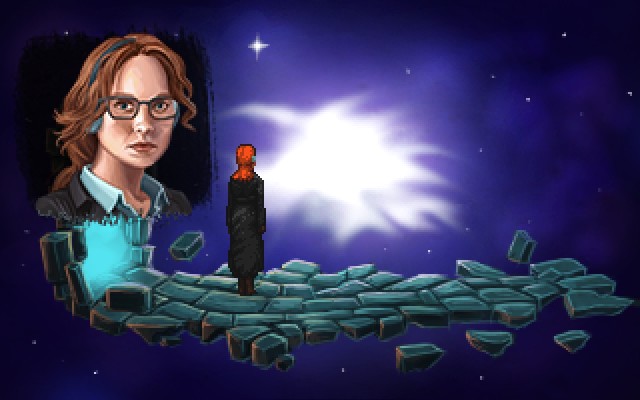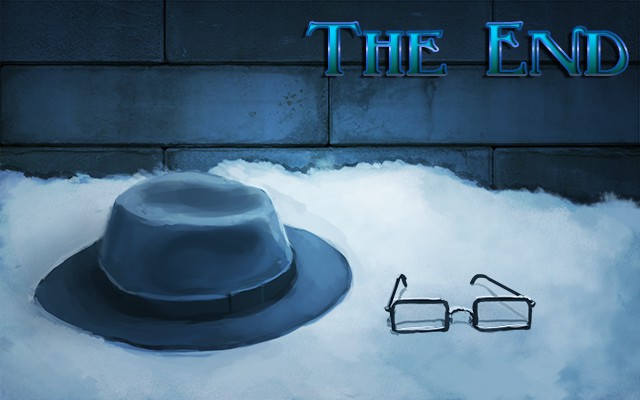Blackwell: A five game series of point-and-click adventures about guiding lost souls to the afterlife. I love point-and-clicks, and Blackwell has a lot of good elements to it – psychic detectives, a touch of gothic horror, and just a good overall point–and–click atmosphere. Unfortunately, unlike the games I just linked, those elements just never came together for me. This view may be biased (particularly against the later games) since I just came off of 10 hours of playing through the series (and I’ll admit, I had to look up a few puzzles), but I feel that I have to write this before my memory fails me.
Point-and-Clicks
That isn’t to say that these games are bad – in fact, they steadily improve as you play through the series. These are solid Tier Two games – with the notable exception of the second game, Blackwell Unbound. The trouble here comes more from the potential you find in point-and-click games. For me, point-and-click games exist in a unique middle ground for video games. In a fully “free” or open-world game, your practically unlimited agency makes small things like not being able to jump a two-foot-high fence a remarkable annoyance. In a platformer, story is often neglected. In a visual novel, there is no real challenge or choice (though there are exceptions to that rule). Conversely, a good point-and-click adventure gives you just the amount of freedom to let you feel as if you contribute, just enough challenge to keep you thinking, and just enough story to keep you engaged.
Perhaps I’m biased. At the end of my favorite point-and-click, The Longest Journey, I found myself unable to play any video games for a day or two – anything else would have been less perfect. Between TLJ representing the pinnacle of story-telling and Submachine representing the pinnacle of puzzle-solving, any new point-and-click adventure game has a high bar to clear. But before I go further about the overarching adventure, let me give you my per-game opinions. For the record – and because I was constantly confused about it myself – the games go in this order:
- The Blackwell Legacy
- Blackwell Unbound
- Blackwell Convergence
- Blackwell Deception
- Blackwell Epiphany
The Blackwell Legacy
I’m afraid I don’t have any pictures for this one, since I beat it some time ago. That says something, as I never found the motivation to go on to the rest of the series. The protagonist, Rosa Blackwell, is a medium that leads lost souls – ghosts – to the afterlife, with the aid of her spirit guide, Joey Mallone. Joey is a 30s clothing shop clerk who was gunned down after his best friend got into debt with a loan shark. This is important, as it is never clearly explained why Joey is special or how often these “spirit guides” are created. A Tier Two game since I had fun, but there wasn’t enough of the overarching plot to really draw me in.
Blackwell Unbound
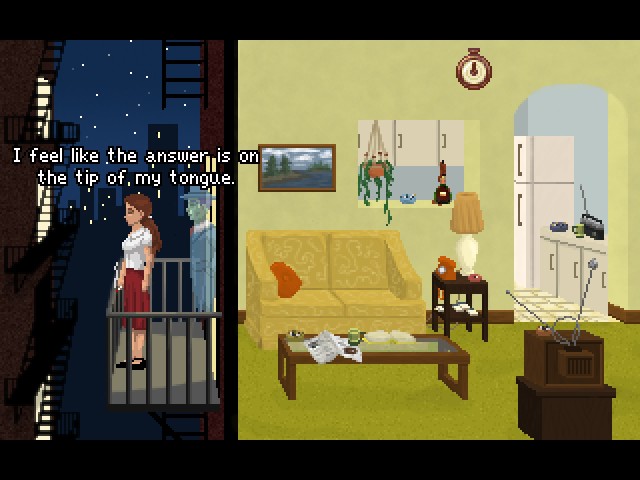
Unbound is a prequel, following the aunt of Rosa – mentioned in the first game – back before she lost her grip on reality after the universe poured into her mind. That’s understandable, but this game frustrated me the most in the series. The protagonist isn’t particularly likable, the puzzles were the worst of the series, and the only connection to the main games was explained in 30 seconds in the next game. You can safely skip this game and move on to Convergence without losing much, so it must be relegated to Tier Three.
Blackwell Convergence
I think this was my favorite of the series: just the right blend of mysterious foreboding and day-to-day ghostbustin’. One of the most important mechanical changes happened here as well – your cursor changes color depending on which character you are currently controlling (which was quite relieving, having played the previous game). The series’ art also peaked right around here. The pixel art may not be quite as good as Epiphany, but at least the character portraits aren’t in a jarringly different style. The NPCs are well-developed and feature some of the best side characters of the series. It finishes strong with the hope of future adventures ahead. The entire game has charm and conjures up that certain panache which good 90s games captured so well. This is the game I almost put into Tier One – and if you’re okay with a semi-cliffhanger, I’d almost suggest that you stop playing here (while also having skipped Unbound).
Blackwell Deception
And they were doing so well. While this game keeps some of the refinement of the previous one, it also introduces the two major issues I had with the series: a strangely uncharacteristic tone and an increasingly jarring art style. Scroll up a bit – see that beautiful “spiritual realm” art? Well, for some reason, this game makes the same place look like a 90s sci-fi set:
To be entirely fair, this game also introduced two things that greatly streamlined gameplay. The first is a mobile phone so you don’t have to go running home to look things up every ten seconds. The second is this slider:
Walking speed. WALKING. SPEED. Every point-and-click needs this. I almost forgive this entire game its increasingly bizarre tone just for that slider. I would sell my left arm to have that in The Longest Journey – as much as I love that game. But even counting that slider, this too must fall into Tier Two.
Blackwell Epiphany
This game has some of the best art of the series – and more importantly, it has widescreen resolutions. Well, a widescreen resolution. Did I mention that all the previous games run at 640×480? This one runs at 640×400. Apparently, HD is a foreign concept even in 2013.
Even so, the wonderful art doesn’t entirely forgive the definite changes in tone. This is certainly the most “film noir” of the series, but that doesn’t really fit in with the rest of the series. Especially when you compare Legacy to Epiphany, you wonder where the tone shift of the last two games came from. Epiphany has ghosts ripped apart, child ghosts, suicide, prostitution, and more. It really feels too much like an attempt to have a serious (and bittersweet) ending. Worse yet, several main plot points aren’t resolved and the epilogue throws in a strange twist not even hinted at previously that entirely invalidates the plot progression from the previous game. I should clarify that I’m not complaining because everything didn’t end up perfect for everyone – I’m a sucker for bittersweet endings. I’m complaining because the ending didn’t make sense and didn’t fit in with the information given to us in previous games. It avoids Tier Three because it is pretty and does provide some touching moments. At least they kinda fixed the spiritual realm art:
And now that I’m thinking about it, this scene’s art has quite the Doctor Strange vibe (though mostly I just wanted to use this screenshot).
The Series
From a mechanical standpoint, the Blackwell series isn’t particularly impressive. Visual cues are often lost in the backdrop and important mechanics don’t always act the way you want. None of the puzzles really stood out, preferring to blend into the story. That’s a stylistic choice, and I can respect that – but it does make the few puzzles which require video-gamey logic particularly immersion-breaking. This improved in later games, but there were still a few strange leaps of logic to be made, and the requirement that you talk to everyone about a subject five to six times particularly grates.
I liked the characters, and the overarching story was engaging enough to motivate me to finish the series. That being said, the tone shifts unnecessarily in the final two games: introducing elements that really don’t fit into the earlier mythos in an effort to make it more serious. Lovecraftian horror I can get behind, but the grimdark turn this game takes… I cannot. If you just play the games with Nishanthi in them (which would be the first and third ones), you’ll be fine.

